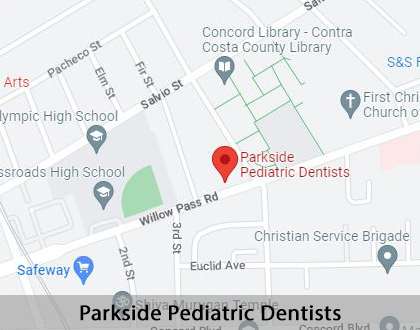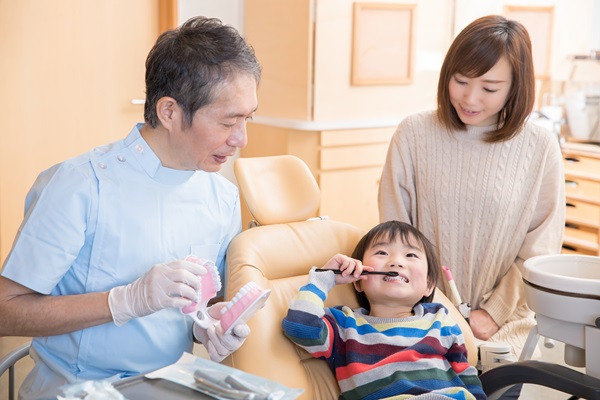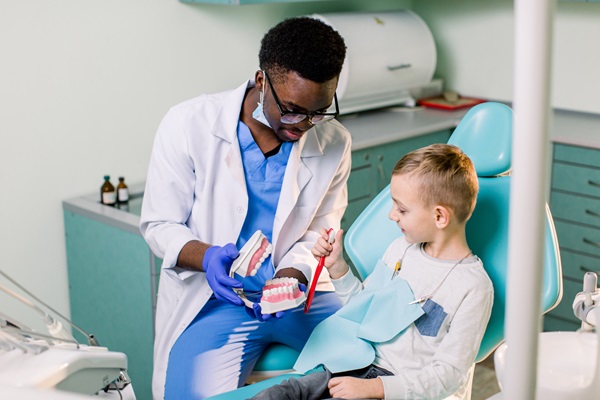Baby Root Canal Concord, CA
A root canal is a common treatment used to address many kinds of tooth pain. When a child is suffering from a cavity close to the nerve, a pediatric dentist may recommend a baby root canal. A baby root canal includes removing all the decay, treating the nerve, and adding a crown.
While it may seem like an aggressive treatment, saving baby teeth can help prevent future oral health issues. Baby root canals are available at Parkside Pediatric Dentists in Concord and the surrounding area. Call us at (925) 504-4011 to schedule an appointment to discuss whether this treatment is the right option for your child.
Prepping for the Process
If a baby root canal is deemed necessary, we can schedule an initial consultation with the pediatric dentist. During this appointment, parents can share their child’s medical history, give us a list of medications, and ask questions. We will go over the severity of the tooth decay, as well as treatment, sedation options, and after-care.
There are misconceptions that root canals are extremely painful, but this should not be the case. The procedure is acceptable for children, generally causes little discomfort, and can relieve tooth pain. The first thing parents can do is to stay calm and reassuring, so their child will feel comfortable during the procedure.
The pediatric dentist will talk to the child and parent about the procedure and why they need it. Parents can help reinforce that message and help the child understand what will happen. Telling the child that there will be medicine to keep them from feeling pain can be helpful
Parents should talk to the pediatric dentist about different options for anesthesia if their child needs extensive work, is very anxious, or has special health care needs. They will also want to ask about whether or not antibiotics will be prescribed after treatment and discuss any allergies the child might have that could affect both anesthesia and antibiotics.
“The first thing parents can do is to stay calm and reassuring so the child will feel comfortable.”
What to Expect
During a baby root canal, the pediatric dentist will first use a local anesthetic to numb the area thoroughly. After isolating the tooth, we will then remove any decay and assess the health of the tooth's nerve. If the removal of the decay results in exposure of the nerve, or nerve damage, we will remove the infected part of the nerve.
The pediatric dentist will then make sure the rest of the nerve is healthy. If it is, we will apply medicine to heal the nerve. The tooth will then be built back up and covered with a crown. The crown covers the tooth and gives it strength to keep it from fracturing later. It restores the child's tooth to its normal size, shape, and function to help it resemble the rest of the teeth.
“During a baby root canal, the pediatric dentist will first use a local anesthetic to numb the area thoroughly.”
The Healing Process
After a baby root canal, the child should be able to return to normal activities right away. Eating should be avoided until the area is no longer numb from the anesthetic. This prevents the child from accidentally biting the lip or cheek. If the tooth was severely infected, the pediatric dentist might prescribe antibiotics. The area around the tooth may be slightly swollen and sensitive for a few days, so an over-the-counter pain reliever designed for children can help make the child more comfortable.
Since the procedure does not require stitches, no extra care around the procedure's site will be necessary. The child should continue brushing and flossing twice a day as normal to maintain good oral health. The baby root canal will hold until the child’s permanent tooth comes through the gums.
“After a baby root canal, the child should be able to return to normal activities right away”
Check out what others are saying about our dental services on Yelp: Baby Root Canal in Concord, CA
Post-Procedure Guidelines
Following a baby root canal procedure, patients should rest and avoid any strenuous activity. We may recommend medication and antibiotics to prevent inflammation or infection in the treatment area. The patient will need to go over specific instructions with the dentist before leaving.
Although it is rare, it is possible to get an infection after a baby root canal. Parents should call the pediatric dentist if their child experiences increasing pain, new inflammation or signs of infection around the tooth, increased tooth sensitivity to hot and cold, or an inability to chew on the tooth. These are all signs of a possible infection and should be treated immediately.
“Although it is rare, it is possible to get an infection after a baby root canal.”
Questions Answered on This Page
Q. How can parents prepare themselves and their child before a root canal?
Q. What can I expect during a baby root canal?
Q. What does the healing process involve?
Q. What are the signs of a post-procedure infection?
Q. When is a baby root canal necessary?
People Also Ask
Q. What are some pediatric dental emergencies?
When a Baby Root Canal is Necessary
A baby root canal and subsequent crown are necessary when the tooth has a large cavity or is broken. A filling is not durable enough to repair severely decayed or fractured teeth due to the risk of falling out, breaking, or wearing out. According to the American Academy of Pediatric Dentistry, a baby tooth with extensive decay is unlikely to be fixed with a traditional filling. However, it is possible to restore it with a stainless steel crown.
While it may seem silly to try to repair a baby tooth, keeping these teeth healthy until they fall out on their own helps the permanent teeth grow into their proper position. This can save on future treatment. Additionally, the enamel of baby teeth is thinner, so decay can spread more quickly between teeth. Crowns can not only save the decayed tooth but help prevent the spread of decay and infection to the rest of the mouth, including the child’s permanent teeth.
When damage to the tooth is less severe, a pulpotomy may be an option. This procedure removes just the damaged portion of the pulp, or all the pulp in the upper chamber of the tooth, without touching the root canals. The pulp is the interior of the tooth that contains the tooth's blood supply and nerves. The pediatric dentist will remove the damage, stabilize the rest of the healthy pulp, and possibly disinfect and seal the tooth with a crown.
If the pulp tissue is infected through the entire tooth, a pulpectomy, or baby root canal, is necessary. The pediatric dentist will remove all the pulp tissue from the tooth’s upper chamber and the roots, disinfect the root canals, and then fill and seal them. A crown will be used to protect the entire tooth.
Both of these procedures are approved for children and use materials designed for a child’s health and well-being. Furthermore, they offer welcome relief from tooth pain. Parents can go into the procedure feeling confident that it is the right decision for their oral health of their child.
“While it may seem silly to try to repair a baby tooth, keeping these teeth healthy until they fall out naturally helps the permanent teeth grown into their proper position.”
Frequently Asked Questions
Q. Why does my child need a baby root canal?
A. When tooth decay has progressed beyond what a normal filling can address, and there is a significant infection, a baby root canal may be recommended. The procedure is acceptable for children and will help relieve pain by removing the damaged portions of your child’s tooth. Not getting the infection addressed can lead to more pain.
Q. What happens during a baby root canal?
A. During this procedure, we will thoroughly numb the area and remove the diseased pulp. Then the chambers and canals of the tooth are disinfected and filled. Finally, the top of the tooth is then covered by a durable crown which will last until the baby tooth is ready to fall out naturally.
Q. What can I expect after a baby root canal?
A. Eating should be avoided until the area is no longer numb from the anesthetic. If the tooth was severely infected, the pediatric dentist may prescribe antibiotics. The area around the tooth may be slightly swollen and sensitive for a few days, so an over-the-counter pain reliever designed for children can help make the child more comfortable. The child should continue brushing and flossing twice a day as normal to maintain good oral health.
Q. Is a baby root canal safe?
A. A baby root canal is an approved procedure that uses materials designed for children. It is relatively painless, and recovery time is minimal. Choosing to save a baby tooth can help prevent future oral health issues in your child.
Q. Are baby root canals covered by dental insurance? How much do they cost?
A. As every dental plan is different, each treatment and procedure type varies in eligibility. We advise parents to check with their child’s insurance provider to fully understand what their plan entails and their coverage. On average, baby root canals can cost anywhere between $200 to $1,500, depending on the severity of the child’s case and the location of the tooth in the mouth.
Quality Pediatric Dental Services Can Transform Smiles
By visiting us as soon as possible, our team can help get your child the professional treatment they need.
Definition of Pediatric Dental Terminology
Call Us Today
Yes, baby teeth do eventually fall out, but they remain a vital component of your child’s oral health. Taking care of their baby teeth also helps with the longevity and health of their permanent teeth. If your child is suffering from tooth pain, call us at 925-504-4011 to speak to a pediatric dentist about the treatment options available to help.
If you live in the Concord area, call 925-504-4011 for an appointment in our Concord office.
Helpful Related Links
- American Dental Association (ADA). Glossary of Dental Terms. 2021
About our business, license, and website security
- Parkside Pediatric Dentists was established in 2022.
- We accept the following payment methods: American Express, Cash, Check, Discover, MasterCard, and Visa
- We serve patients from the following counties: Contra Costa County
- We serve patients from the following cities: Concord, Martinez, Pleasant Hill, Bay Point, Walnut Creek, and Antioch
- CA (License #63379). View License Information and Specifics
- National Provider Identifier Database (1255749644). View NPI Registry Information
- Norton Safe Web. View Details
- Trend Micro Site Safety Center. View Details
Back to top of Baby Root Canal







